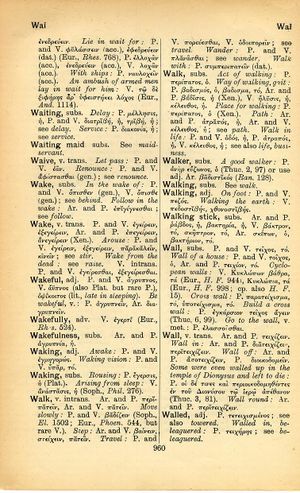wake: Difference between revisions
From LSJ
ὥστε πλείους ἢ χιλίας ἱεροδούλους ἐκέκτητο ἑταίρας → it owned more than a thousand temple-slaves, courtesans
m (Woodhouse1 replacement) |
mNo edit summary |
||
| Line 3: | Line 3: | ||
===substantive=== | ===substantive=== | ||
[[in the wake of]]: [[prose|P.]] and [[verse|V.]] [[ | [[in the wake of]]: [[prose|P.]] and [[verse|V.]] [[ὄπισθεν]] (gen.), [[verse|V.]] [[ὄπισθε]] (gen.); see [[behind]]. | ||
[[follow in the wake]]: [[Aristophanes|Ar.]] [[prose|P.]] [[ἐπιγίγνεσθαι]]; see [[follow]]. | [[follow in the wake]]: [[Aristophanes|Ar.]] [[prose|P.]] [[ἐπιγίγνεσθαι]]; see [[follow]]. | ||
Revision as of 10:46, 27 June 2020
English > Greek (Woodhouse)
substantive
in the wake of: P. and V. ὄπισθεν (gen.), V. ὄπισθε (gen.); see behind.
follow in the wake: Ar. P. ἐπιγίγνεσθαι; see follow.
verb transitive
P. and V. ἐγείρειν, ἐξεγείρειν, Ar. and P. ἐπεγείρειν, ἀνεγείρειν (Xen.).
arouse: P. and V. ἐγείρειν, ἐξεγείρειν, παρακαλεῖν, κινεῖν; see stir.
wake from the dead: see raise.
verb intransitive
P. and V. ἐγείρεσθαι, ἐξεγείρεσθαι.

